The "5G FRMCS Planning Phase to FRMCS Build" course offered by Wray Castle Ltd is a comprehensive training program designed to equip telecommunications professionals with the knowledge and skills needed to successfully plan and implement Future Railway Mobile Communication System (FRMCS) projects within the 5G framework.
This course covers a wide range of topics, including FRMCS architecture, network design, implementation strategies, and best practices for ensuring the successful deployment of FRMCS solutions. Participants will learn how to effectively plan and manage FRMCS projects, from initial concept development through to system integration and testing.
The course is ideal for telecommunications engineers, project managers, and other professionals involved in the planning and implementation of FRMCS projects. It is also suitable for individuals looking to enhance their skills and knowledge in the rapidly evolving field of 5G technology.
By enrolling in this course, participants will gain a deep understanding of the technical aspects of FRMCS, including radio access network design, core network configuration, and network slicing. They will also learn about the regulatory and security considerations that are critical to the successful implementation of FRMCS projects.
The "5G FRMCS Planning Phase to FRMCS Build" course is delivered through a combination of live and self-paced modules, virtual labs, and interactive exercises. Participants will have access to expert tutors, digital badges, webinars, glossaries, and other resources to support their learning journey.
Overall, this course provides a comprehensive and practical training experience that will enable participants to confidently plan and implement FRMCS projects within the 5G framework. By completing this course, professionals will be well-equipped to take on the challenges of deploying FRMCS solutions in the evolving landscape of telecommunications technology.
5G/IP: FRMCS Planning Phase to FRMCS Build
-
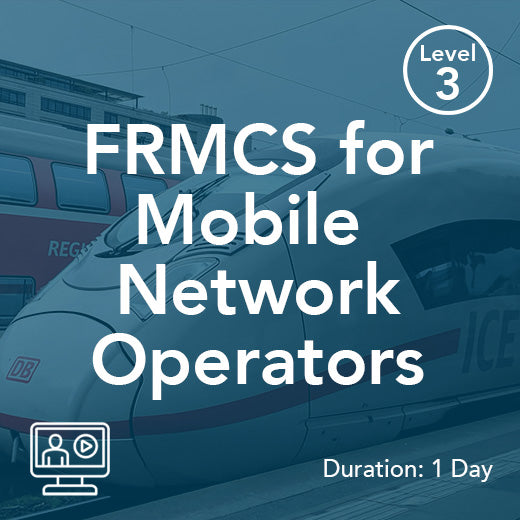
FRMCS For Mobile Network Operators
Railways worldwide have relied on GSM-R, a specialised adaptation of commercial GSM technology, for critical train-to-controller voice communications and digital signalling for over 15 years. However, GSM-R is reaching the end of its lifecycle and will become obsolete by 2035. The International Union of Railways (UIC) has launched the Future Railway Mobile Communications System (FRMCS) project to design and implement the next-generation communication system. Unlike its predecessor, FRMCS leverages cutting-edge 5G technology and offers mobile network operators (MNOs) a unique opportunity to contribute to this transformative shift in railway communications. This course provides an in-depth overview of FRMCS, highlighting: The transition from GSM-R to FRMCS, including timelines and standards. Planned 5G-based network architecture. Key challenges, such as spectrum allocation, coverage, and capacity. The critical role of MNOs, from infrastructure sharing to delivering broadband services. Tailored for mobile network operators, this course equips participants with the insights needed to engage with the FRMCS initiative, seize new opportunities, and contribute to the success of the next-generation railway communication system.
POA: Private Course
-
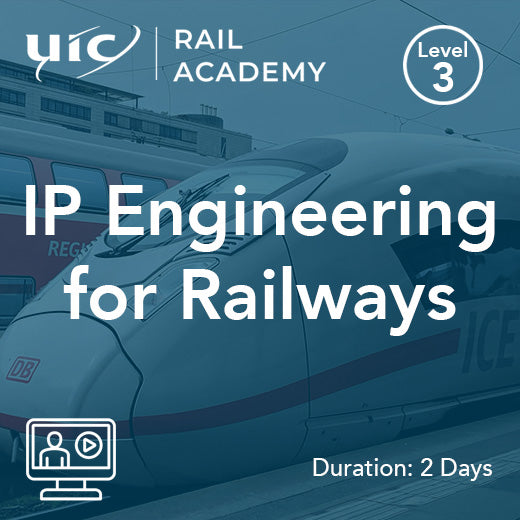
IP Engineering for Railways
IP Engineering for Railways delivers a detailed overview of Internet Protocol networks. Delivering an understanding of Engineering techniques, as well as applications, protocols and switching methods, it enables delegates to work confidently in the IP environment. Other topics explored include QoS, security, VPNS and Multimedia over IP. With the emergence of FRMCS our 5G Rail portfolio addresses the technical requirements of FRMCS. Who would benefit Those needing to understand how IP networks are designed and implemented. Prerequisites Some knowledge or experience of packet-switched data network operation and Internet technology is beneficial. Topic Areas Include Background to the Internet and ISPs The Data Link, IP, Transport and Application layers IPv6 The Domain Name System (DNS) Introduction to MPLS Access services E-mail services and web hosting Name servers Service Provider Network architectures Peering Routing in IP networks Overview of OSPF and BGP4 IP QoS technologies Security engineering IP VPNs IP multimedia services
POA: Private Course
-
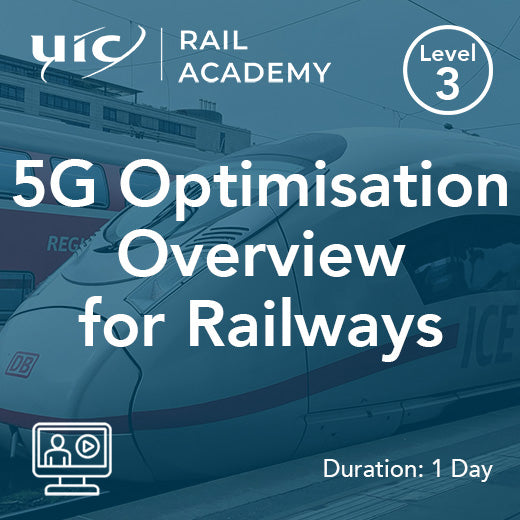
5G Engineering Overview for Railways
This 5G Engineering Overview for Railway course is a technical overview of 5G. The course includes the design goals and development schedule for 5G, and the principles and architecture of the 5G air interface, radio access network and core network. With the emergence of FRMCS our 5G Rail portfolio addresses the technical requirements of FRMCS. Who would benefit This course is intended for engineers either new to, or already working in, mobile communications. Prerequisites Familiarity with telecommunications and general engineering terminology is assumed. Some understanding of LTE cellular systems would be beneficial. Topic Areas Include 5G introduction and key features Standardisation and timelines for 3GPP and the ITU Use cases and performance objectives Radio spectrum and millimetre wave communications Principles of radio transmission and reception in 5G Radio access network architecture Non standalone and standalone deployment options Core network architecture Network function virtualisation and network slicing Interworking and compatibility between 5G, LTE and Wi-Fi
POA: Private Course
-
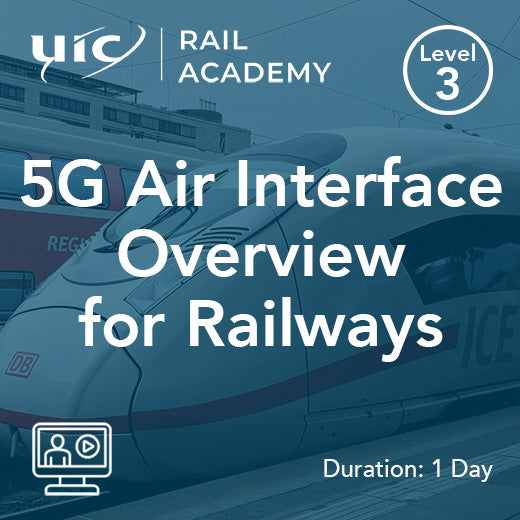
5G Air Interface Overview for Railways
This 5G Air Interface Overview for Railways course is a technical introduction to the 5G New Radio. The course includes the design goals and development schedule for 5G, and the principles, design and implementation of the 5G air interface. With the emergence of FRMCS our 5G Rail portfolio addresses the technical requirements of FRMCS. Who would benefit This course is intended for engineers either new to, or already working in, mobile radio communications. Prerequisites Familiarity with telecommunications and general engineering terminology is assumed. Some understanding of LTE cellular systems would be beneficial. Topic Areas Include: 5G introduction, key features and standardisation Use cases and performance objectives Non-standalone and standalone deployment options Radio spectrum and millimetre wave communications Principles of radio transmission and reception in 5G Multiple antennas in 5G Air interface protocol stack Architecture of the air interface physical layer Procedures for data transmission and reception on the 5G air interface
POA: Private Course
-
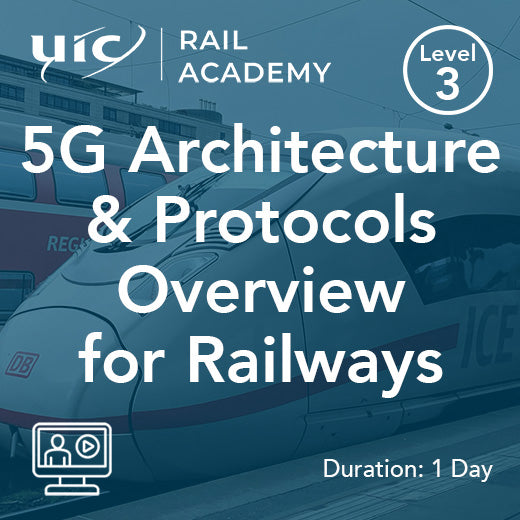
5G Architecture and Protocols Overview for Railways
This 5G Architecture and Protocols Overview for Railways course is a technical introduction to the 5G network. The course includes the design goals and development schedule for 5G, the principles, design and implementation of the core and radio access networks of 5G. With the emergence of FRMCS our 5G Rail portfolio addresses the technical requirements of FRMCS. Who would benefit This course is intended for engineers either new to, or already working in, mobile communication networks. Prerequisites Familiarity with telecommunications and general engineering terminology is assumed. Some understanding of LTE cellular systems would be beneficial. Topic Areas Include: 5G introduction, key features and standardisation Use cases and performance objectives Radio access network architecture and protocols Non standalone and standalone deployment options Core network architecture and protocols Network function virtualisation and network slicing Interworking and compatibility between 5G, LTE and Wi-Fi PDU connectivity, Quality of Service and service provision Signalling procedures in the 5G network
POA: Private Course
-
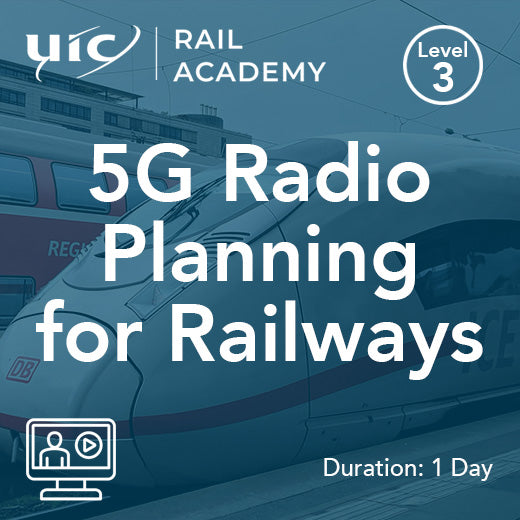
5G Radio Planning for Railways
The heart of any cell planning process begins with coverage and capacity estimations, this 5G Cell Planning for Railways training course will guide you through the variables that impact both coverage and capacity and provides practical worked examples for a variety of scenarios. As well as the planning process it is also important to understand the RF KPIs and measurements that determine link performance, the essential signals and measurement techniques of the NR are covered in this training as well as a detailed look at parameters that affect the random access process, location management and PCI planning. At the conclusion of this training the student will be well versed in the theory and practice of 5G cell planning with a good understanding of both the principles and application of planning techniques. With the emergence of FRMCS our 5G Rail portfolio addresses the technical requirements of FRMCS. Who Would Benefit This course is intended for network planning engineers working in the rail industry, who wish to learn about the issues that are involved when planning radio access networks for 5G FRMCS Prerequisites The course assumes familiarity with telecommunication systems and with the principles of radio network planning gained from planning GSM-R networks. Otherwise, experience gained in network planning for LTE, and knowledge of the 5G air interface, would be beneficial. Topic Areas Include Fundamentals of the 5G Air Interface Link Budget Estimation Coverage Estimation Capacity Estimation RSRP, RSRQ and SINR Parameter Setting
£1,815.00
-
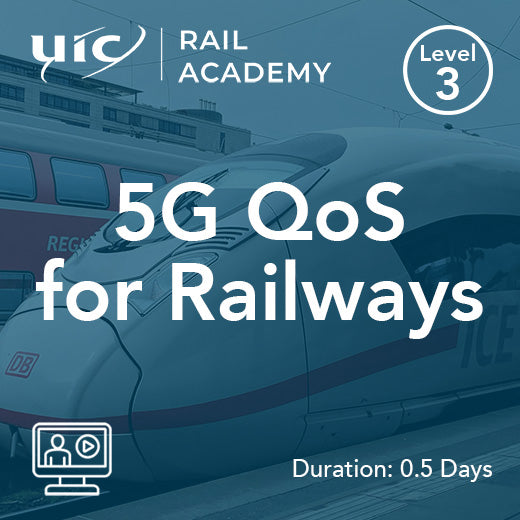
5G QoS for Railways
5G QoS for Railways is designed for those involved in the QoS and charging management and operations in 5G Standalone Networks Prerequisites The focus of this course is only on the PCC framework as specified by 3GPP thus participants should be familiar with 5G operations and general features prior to attending this training. Course Contents 5G PCC Framework Architecture 5G QoS Model Access and Mobility Association Session Management Policy Association AF Influence on Policy Decisions PCF Selection PCC Rules and PCC Rule handling
POA: Private Course
-
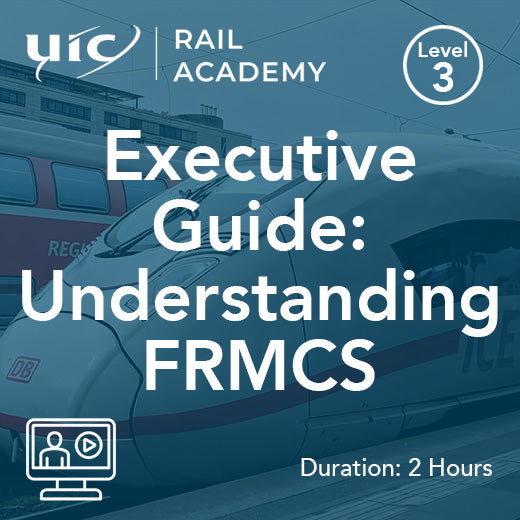
Executive Guide: Understanding FRMCS
This concise executive briefing provides a high-level overview of the Future Railway Mobile Communication System (FRMCS), the next-generation communication standard for railways, is designed to assist executives seeking to understand the impact and opportunities arising from this new technology. The course explains what FRMCS is, the implication of some of the technical changes on the requirements for physical assets, why it is essential, and the implementation timeline for the migration from GSM-R. Participants will explore the architectural framework, key challenges in deployment, and the business opportunities it presents. Designed for busy executives, this course delivers practical insights in an accessible format.Prerequisites No prior knowledge of FRMCS, GSM-R, or telecommunications is required. This course is designed for those new to the topic, ensuring all acronyms are explained, and foundational concepts are introduced. Who Would Benefit Executives outside of rail companies charged with understanding the business impact or opportunity of FRMCS to their business, for example those already working in the railway ecosystem, those seeking business development opportunities in the rail sector, or those within the telecommunications sector seeking to explore the opportunity offered by FRMCS. Sales professionals preparing for client meetings or presentations involving railway communication systems. Business development / strategy development executives / managers exploring opportunities in the rail and telecom sectors. Policy-makers and regulators overseeing railway digitalisation efforts.Engineers and project managers who need a foundational understanding of FRMCS to support project planning or cross-functional collaboration. Course Contents Introduction GSM-R: The Context Why GSM Needs Replacement Introducing FRMCS FRMCS Challenges Stakeholders and Business Opportunities Timeline
POA: Private Course
-
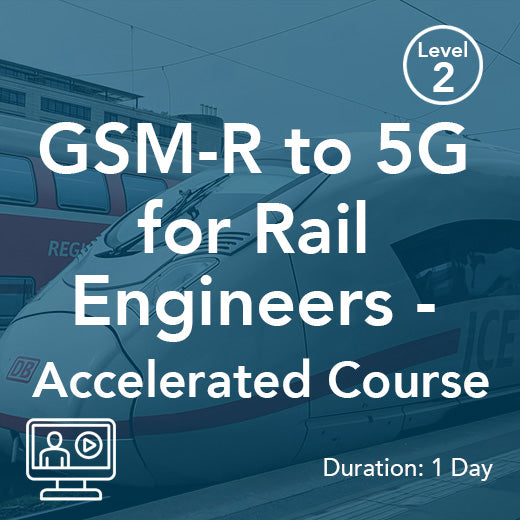
GSM-R to 5G for Rail Engineers – Accelerated Course (On-Demand)
This accelerated one-day course provides rail engineers and technical professionals with a clear understanding of the transition from GSM-R to the Future Railway Mobile Communication System (FRMCS). It explores the fundamental differences in architecture, services, spectrum, and radio technology, highlighting how FRMCS leverages 5G capabilities to deliver enhanced performance, security, and flexibility. Through structured comparisons, participants gain the knowledge needed to appreciate the opportunities and challenges of modernising railway communications and supporting the shift towards the digital railway. This self-paced on-demand distance learning course features illustrated course books, videos, tests and full tutor support. During the course you'll learn: The key technological differences between GSM-R and FRMCS. How network architectures, radio technologies, and addressing schemes compare. The changes in spectrum allocation and radio operation. How 5G technology introduces stronger security and new capabilities for critical railway applications. Who Would Benefit This course is designed for railway engineers, telecom specialists, project managers, and technical administrators who need a clear overview of how FRMCS builds on and differs from GSM-R. It will be particularly valuable for those involved in planning, deploying, or supporting the next generation of railway communication systems, as well as stakeholders who need to understand the operational and technical impacts of the transition to 5G-based FRMCS. Prerequisites A background in GSM-R or GSM would be advantageous. Course Modules Railway Communications Network Architecture Addressing Radio Technology Radio Spectrum Security GSM-R vs FRMCS
£1,336.00






















